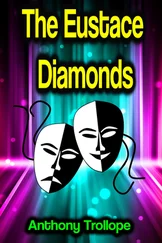Anthony Trollope - The Landleaguers
Здесь есть возможность читать онлайн «Anthony Trollope - The Landleaguers» — ознакомительный отрывок электронной книги совершенно бесплатно, а после прочтения отрывка купить полную версию. В некоторых случаях можно слушать аудио, скачать через торрент в формате fb2 и присутствует краткое содержание. Жанр: foreign_prose, на английском языке. Описание произведения, (предисловие) а так же отзывы посетителей доступны на портале библиотеки ЛибКат.
- Название:The Landleaguers
- Автор:
- Жанр:
- Год:неизвестен
- ISBN:нет данных
- Рейтинг книги:4 / 5. Голосов: 1
-
Избранное:Добавить в избранное
- Отзывы:
-
Ваша оценка:
- 80
- 1
- 2
- 3
- 4
- 5
The Landleaguers: краткое содержание, описание и аннотация
Предлагаем к чтению аннотацию, описание, краткое содержание или предисловие (зависит от того, что написал сам автор книги «The Landleaguers»). Если вы не нашли необходимую информацию о книге — напишите в комментариях, мы постараемся отыскать её.
The Landleaguers — читать онлайн ознакомительный отрывок
Ниже представлен текст книги, разбитый по страницам. Система сохранения места последней прочитанной страницы, позволяет с удобством читать онлайн бесплатно книгу «The Landleaguers», без необходимости каждый раз заново искать на чём Вы остановились. Поставьте закладку, и сможете в любой момент перейти на страницу, на которой закончили чтение.
Интервал:
Закладка:
This variance of feeling might be seen in the three priests who have been already mentioned in our story. Father Giles was the parish pastor of Headford, in which position he had been for nearly forty years. He was a man seventy years of age, in full possession of all his faculties, very zealous in the well-being of his people, prone to teach them that if they would say their prayers, and do as they were bid by their betters, they would, in the long run, and after various phases of Catholic well or ill-being, go to heaven. But they would also have enough to eat in this world; which seemed to be almost more prominent in Father Giles's teaching than the happy bliss of heaven. But the older Father Giles became the more he thought of the good things of this world, on behalf of his people, and the less he liked being troubled with the political desires of his curate. He had gone so far as to forbid Father Brosnan to do this, or to do that on various occasions, to make a political speech here, or to attend a demonstration there; – in doing which, or in not doing it, the curate sometimes obeyed, but sometimes disobeyed the priest, thereby bringing Father Giles in his old age into infinite trouble.
But Father Malachi, in the neighbouring parish of Ballintubber, ran a course somewhat intermediate between these two. He, at the present moment, had no curate who interfered with his happiness. There was, indeed, a curate of Ballintubber – so named; but he lived away, not inhabiting the same house with Father Malachi, as is usual in Ireland; having a chapel to himself, and seldom making his way into our part of the country. Father Malachi was a strong-minded man, who knew the world. He, too, had an inclination for Home Rule, and still entertained a jealousy against the quasi-ascendency of a Protestant bishop; but he had no sympathy whatever with Father Brosnan. Ireland for the Irish might be very well, but he did not at all want to have Ireland for the Americans. Father Giles and Father Malachi certainly agreed on one thing – that Brosnan was a great trouble.
If the conversion of Florian Jones was to be attributed to any clerical influence, Father Brosnan was entitled to claim the good or the evil done; but in truth very few polemical arguments had been used on the occasion. The boy's head had been filled with the idea of doing something remarkable, and he had himself gone to the priest. When a Protestant child does go to a priest on such a mission, what can the priest do but accept him? He is bound to look upon the suppliant as a brand to be saved from the burning. "You stupid young ass!" the priest may say to himself, apostrophising the boy; "why don't you remain as you are for the present? Why do you come to trouble me with a matter you can know nothing about?" But the priest must do as his Church directs him, and the brands have to be saved from the burning. Father Brosnan sent the boy to Father Malachi, and Father Malachi told the lad to go to his terrestrial father. It was this that Mr. Jones had expected, and there the boy was received as a Catholic.
But to Father Brosnan the matter was much more important in its political view. Father Brosnan knew the application as to his rent which had been made by Pat Carroll to his landlord. He was of opinion that no rent ought to be paid by any Irish tenant to any landlord – no rent, at least, to a Protestant landlord. Wrath boiled within his bosom when he heard of the answer which was given, as though Mr. Jones had robbed the man by his refusal. Mr. Brosnan thought that for the present a tenant was, as a matter of course, entitled to abatement in his rent, as in a short time he must be entitled to his land without paying any. He considered not at all the circumstances, whether, as had been the case on certain properties in Mayo, all money expended had been so expended by the tenant, or by the landlord, as had been the case with Pat Carroll's land. That was an injustice, according to Mr. Brosnan's theory; as is all property in accordance with the teaching of some political doctors who are not burdened with any.
It would have been unfair to Mr. Brosnan to say that he sympathised with murderers, or that he agreed with those who considered that midnight outrages were fair atonements; he demanded rights. He himself would have been hot with righteous indignation, had such a charge been made against him. But in the quarrel which was now beginning all his sympathies were with the Carrolls at large, and not with the Jones's at large. At every victory won by the British Parliament his heart again boiled with indignation. At every triumphant note that came over the water from America – which was generally raised by the record of the dollars sent – he boiled, on the other hand, with joy. He had gleams in his mind of a Republic. He thought of a Saxon as an evil being. The Queen, he would say, was very well, but she was better at a distance. The Lord-Lieutenant was a British vanity, and English pomp, but the Chief Secretary was a minister of the evil one himself. He believed that England was enriched by many millions a year robbed from Ireland, and that Ireland was impoverished to the same extent. He was a man thoroughly disloyal, and at the same time thoroughly ignorant, altogether in the dark as to the truth of things, a man who, whatever might be his fitness for the duties of the priesthood, to which he had been educated, had no capability of perceiving political facts, and no honesty in teaching them. But it would have been unjust to him to say that he was a murderer, or that he countenanced murder. To him it was that young Florian now betook himself, and found him seated alone in the back parlour in Father Giles's house. The old priest was out, and Father Brosnan was engaged on some portion of clerical duties. To give him his due, he performed those duties rigidly, and the more rigidly when, in doing them, he obeyed the letter of the law rather than the spirit. As Father Giles, in his idea of his duties, took altogether the other side of the question, and, in thinking of the spirit, had nearly altogether ignored the letter, it may be imagined that the two men did not agree together very well. In truth, Father Giles looked upon Father Brosnan as an ignorant, impertinent puppy, whereas Father Brosnan returned the compliment by regarding Father Giles as half an infidel, and almost as bad as a Protestant.
"Well, Master Florian," said the priest, "and how are things going with you?"
"Oh! Father Brosnan, I'm in terrible throuble."
"What throuble's up now?"
"They're all agin me at home, and father's nearly as bad as any of them. It's all along of my religion."
"I thought your father had given his consent?"
"So he has; but still he's agin me. And my two sisters are dead agin me. What am I to do about Pat Carroll?"
"Just hould your tongue."
"They do be saying that because what Pat and the other boys did was agin father's interest, I am bound to tell."
"You've given a promise?"
"I did give a promise."
"And you swore an oath," said the priest solemnly.
"I did swear an oath certainly."
"Then you must hould your tongue. In such a case as this I cannot absolve you from your word. I don't know what it is that Pat Carroll did." Here it must be admitted Father Brosnan did not stick to the absolute truth. He did know what Pat Carroll had done. All Headford knew that Mr. Jones's meadows had been flooded, and the priest must have known that the present cause of trouble at Castle Morony, was the injury thus done. Father Brosnan knew and approved of Pat Carroll's enmity to the Jones family. But he was able to justify the falsehood of his own heart, by stumbling over the degree of knowledge necessary. There was a sense in which he did not know it. He need not have sworn to it in a Court of Law. So he told himself, and so justified his conscience. "You need not tell me," he went on to say when the boy was proceeding to whisper the story, "I am not bound to know what it is that Pat Carroll does, and what it is that your father suffers. Do you go home, and keep your toe in your pump, as they say, and come to me for confession a day or two before Christmas. And if any of them say anything to you about your religion, just sit quiet and bear it."
Читать дальшеИнтервал:
Закладка:
Похожие книги на «The Landleaguers»
Представляем Вашему вниманию похожие книги на «The Landleaguers» списком для выбора. Мы отобрали схожую по названию и смыслу литературу в надежде предоставить читателям больше вариантов отыскать новые, интересные, ещё непрочитанные произведения.
Обсуждение, отзывы о книге «The Landleaguers» и просто собственные мнения читателей. Оставьте ваши комментарии, напишите, что Вы думаете о произведении, его смысле или главных героях. Укажите что конкретно понравилось, а что нет, и почему Вы так считаете.












